- Home
- ‘It’s important to get arrested’: the words you’d never expect a teacher to say
‘It’s important to get arrested’: the words you’d never expect a teacher to say
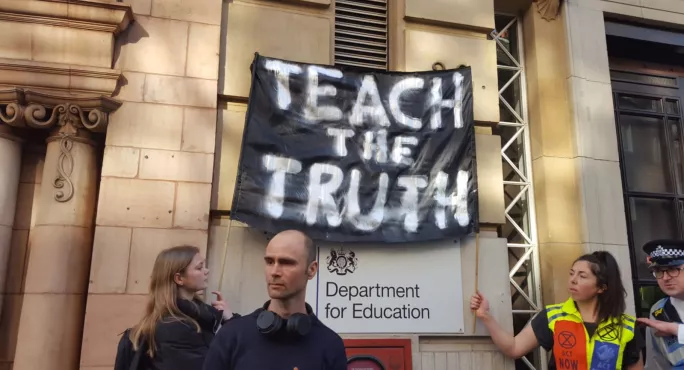
“I think it’s really important to get arrested,” says art teacher Kate Shipp. “Otherwise, in the media it’s just a bunch of hippies, or a bunch of people who aren’t working, or students.”
Being arrested is something the most people are keen to avoid. Can you imagine being handcuffed, driven to a police station, sitting in a police cell, being interrogated, with no idea of what could happen? It’s just not what happens to ordinary people, is it? Ordinary people like your postman, your doctor, your child’s classroom teacher?
But it did happen to primary teacher Shulamit Morris-Evans (pictured below, centre). She’s being charged with aggravated trespassing and criminal damage, after gluing her hands to a turnstile at a Global Coal Management (GCM) office in December. She was protesting with two others against the company's plans to build an open coal mine in Bangladesh.
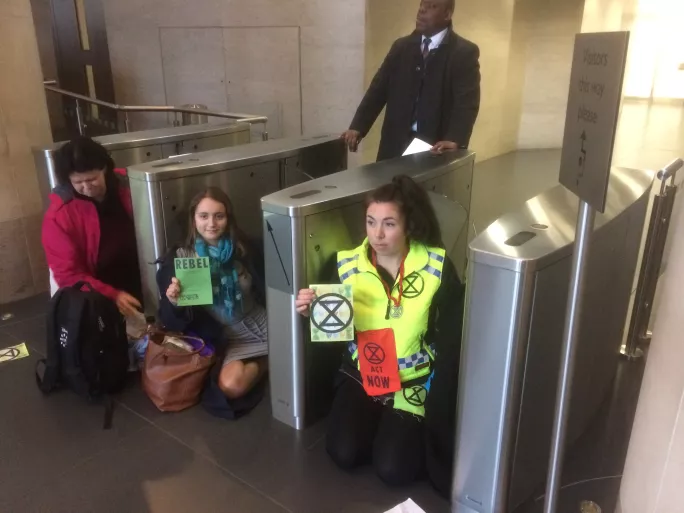
But why does it matter? Why is it worth being arrested for?
Two words: climate change.
According to the United Nations Intergovernmental Panel on Climate Change (IPCC), we have just 12 years to limit global warming to 1.5C. There’s a 1 per cent chance of achieving this.
If warming reaches 3.5C, the climate and ecological effects will be "catastrophic".
What does "catastrophic" look like? Melting of land-based ice masses (data predicts that the Arctic will be ice-free in summer before 2025), rising sea levels, desertification, water shortages, crop failure and food shortages, extreme weather rendering regions inhabitable, wildfires and unsustainable mass migration. We’ve already lost 50 per cent of all animal life since 1970.
And that’s why these teachers believe in getting arrested.
Morris-Evans and Shipp are members of Extinction Rebellion (XR). The group has one mission: achieve radical change in order to minimise the risk of human extinction and ecological collapse. They do this through non-violent civil disobedience, and have up to 2 million members. Some 6,335 of them are happy to be arrested. Of those, 5,234 are prepared to go to prison.
There's every chance you’ll have heard of their protests. In November, they blocked five London bridges, attempted to bury a coffin emblazoned with ‘Our Future’ outside Buckingham Palace, and glued themselves to the doors of the Department for Business, Energy and Industrial Strategy.
In February this year, more than 100 teachers, academics and students blocked traffic and staged mock climate classes outside the Department for Education. Holding signs that read "Teach the Truth", they called for changes to the national curriculum. In March, dozens poured hundreds of litres of fake blood on the roads outside Downing Street, calling it "the blood of our children".
Tomorrow, a week-long protest from XR will start in London. The group plans to block traffic at four high-profile central locations – Marble Arch, Oxford Circus, Waterloo Bridge and Parliament Square – and cause major disruption. Their demands are straightforward: to get the government to acknowledge, publicly, that the country is in a state of crisis with climate change.
Tim Jones, a secondary teacher and co-ordinator of the group Extinction Rebellion Educators (pictured below) says that they want the government to teach the public – within schools and in the media – that “we’re in real shit”.
"That is not a difficult thing for them to do," he says. "It is difficult from their perspective because it opens them up, it holds them to account because once they acknowledge that then they should have to take action."
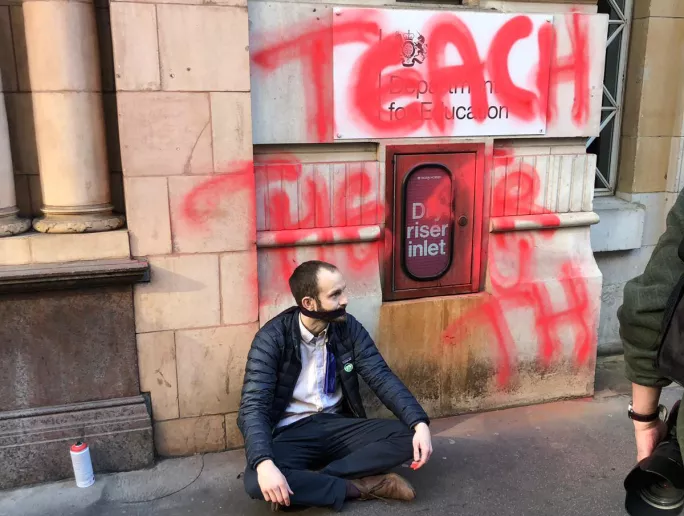
People just aren't aware of the IPCC's warnings, says Shipp.
“We’re talking about a place that is uninhabitable for our children and grandchildren,” she says. “I’ve spent all my career thinking about the needs of children, how to prepare them for an adult life, teaching them things that will enrich them. It will all come to nothing if we don’t make some really serious decisions about the fossil-fuel industry and the way that we treat the planet.”
Reading the IPCC report would be harrowing for anyone but the most hardened climate change denier. But is it really necessary to get yourself arrested to achieve radical change? Especially as a teacher, whose career could be in jeopardy as a result?
Absolutely, says Shipp. She says it’s only by "ordinary people" – the teachers, bus drivers, builders and university lecturers of the world – taking this drastic action that these issues will be taken seriously.
And Morris-Evans is an ordinary person. She had an ordinary middle-class upbringing. Before the arrest in December, she’d never been on the wrong side of the law.
“I’ve never even had a cheeky joint,” she says. “This was my first encounter with the police and going to court. I was at Westminster Magistrates' [Court] for the plea hearing a few months ago, and we pled not guilty. It did feel quite new and a bit stressful and strange.
“In that instance, we were put in a dock with glass all around us. At one point, we were shut in that box, and you do feel like a criminal.”
Morris-Evans says these kinds of acts of civil disobedience are the best and only hope – that we’re facing an all-encompassing threat and conventional methods have failed.
Jones agrees: “My career is of secondary importance to me. I want to carry on teaching, but at the moment, I really don’t think any of us has much of a future if we carry on doing what we’re doing now.
“A lot of teachers are still much more concerned about their reputation, where they sit with their headteacher or about getting a criminal record,” he says.
Jones says his headteacher has assured him that if he were to get arrested, he wouldn’t lose his job. Morris-Evans hasn’t lost hers.
But they are both aware of the potential ramifications on their careers. It hasn’t deterred either of them.
“[Being arrested] seems like the necessary thing to do and it seems even more important that I do it because I do have something to lose,” says Jones. "It sounds fanatical and mad when you put it into words, but I don’t believe we will have anything like the kind of life that we have now in the next 10 or 15 years."
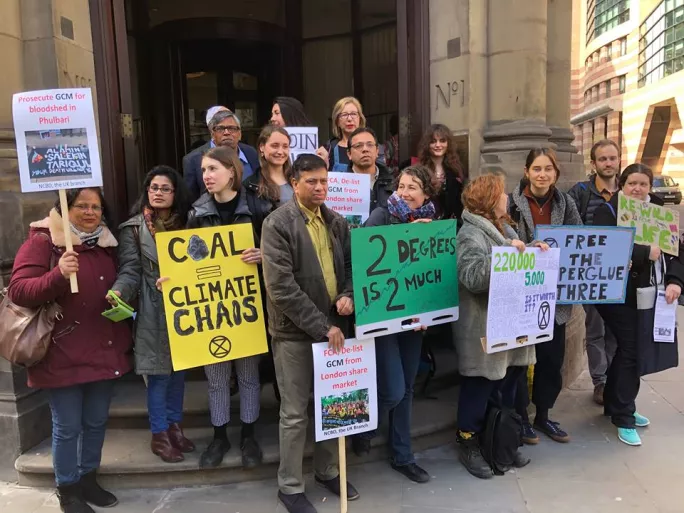
The support network available for any member of XR who finds themselves in handcuffs is extensive. Within the group, there are trained legal observers who act as witnesses and there are lawyers on hand to offer representation. There’s also a wellbeing team who find out what police stations activists are being held at and ensure they have any medication they need.
All members are required to take non-violent, direct action training and are given opportunities to train as legal observers or members of the wellbeing team themselves.
With that kind of support, maybe it’s not such a scary thought after all? Morris-Evans was in "constant contact" with a member of the XR legal team, and when let out of the police station at 3am was met by a group of people offering "hugs and a banana". At her trial, a group of XR activists came to support her (pictured above).
But not everyone remains convinced.
For Ed Stubbs, a secondary science teacher in London, it’s the threat of losing his job that prevents him from adding his name to the "arrest" list of activists.
“Being a teacher is something that brings me a lot of happiness; I’m not willing to sacrifice it. I just want to protest and put pressure on the government to make these changes.
"But I don’t want to jeopardise the big thing that gives me purpose, which is teaching,” he says.
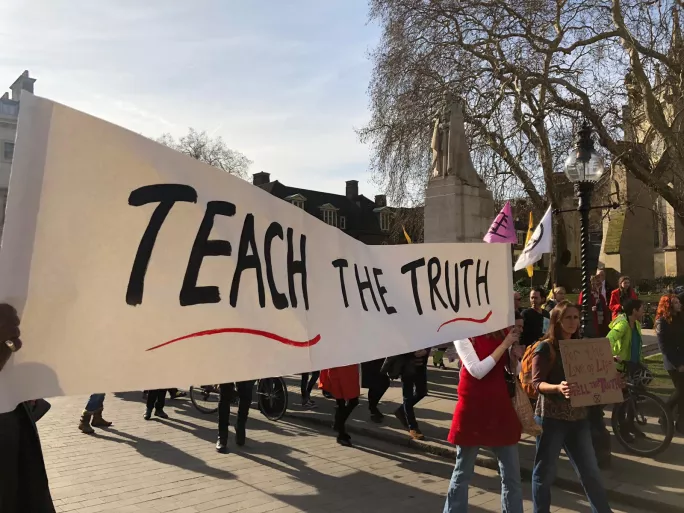
Forest School teacher Alex Forbes, also from London, is still making up her mind.
"I have spoken to my boss about it and she’s along the lines of 'Please don’t get arrested' because it does cause issues in terms of your DBS [Disclosure and Barring Service] check," she says.
"It’s something I need to think about more. Is it more beneficial to be arrested and get it into the media, or is it more beneficial for me to go into schools and talk to students about it?"
There's one thing on which they all agree: the government must take responsibility – and our children must be taught extensively about climate change in schools. They all recognise that the action next week won’t provide a quick fix. But they promise to keep going, to keep escalating their protests until they get a "reasonable response".
Thousands will gather from Monday. It's action that is likely to attract headlines and cause mass disruption – there’s power in bringing London to a halt.
Together with the youth strikers, these teachers are trying to force climate change into the consciousness of the British public, despite the Brexit fog.
Back to Stubbs: “I genuinely care about the futures of young people – that’s why I’m a teacher...To try and make sure that their futures are bright with happiness and joy."
Keep reading for just £1 per month
You've reached your limit of free articles this month. Subscribe for £1 per month for three months and get:
- Unlimited access to all Tes magazine content
- Exclusive subscriber-only stories
- Award-winning email newsletters



